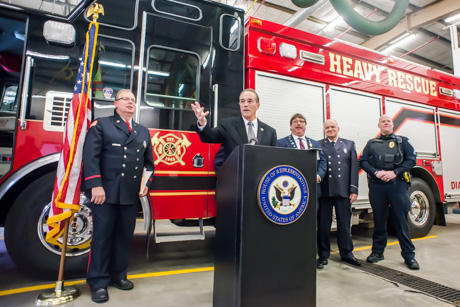
Research released last year concluded that firefighters suffer incidents of cancer at a higher rate than the general population and Congressman Chris Collins thinks more data needs to be gathered to help researchers figure out why.
Collins is sponsoring legislation that will task the Department of Health and Human Services with creating a nationwide database to track and retain information on the emergency responses of firefighters, both career and volunteer.
"I like to call this good common-sense legislation," Collins said during an announcement event at the Town of Batavia Fire Hall on Lewiston Road. "We know Congress is very divided these days, but this is a piece of legislation that will be bipartisan. There is no difficulty whatsoever in getting both Republicans and Democrats to step forward something that is very commonsense and very low cost."
The legislation is backed by firefighter groups both in New York and across the nation. It is in response to a CDC report (pdf) based on a study of 30,000 career firefighters in three large metro departments who served from 1950 to 2010 as well as data from 18,000 current firefighters. The six-year study found a greater number of cancer diagnoses and more cancer-related deaths among the cohort. These were mostly digestive, oral, respiratory, and urinary cancers. Firefighters may also be exposed more frequently to asbestos, increasing the rate of malignant mesothelioma.
Firefighters tend to respond to many instances where not only asbestos might be present, but a whole range of hazardous materials.
Dan Coffey, Town of Batavia's fire chief, said helping HHS gather the data may not be much of a burden on volunteer chiefs. Currently, every firefighter who responds on every call is logged and if there is suspected exposure to something hazardous, that is also logged and kept on file forever. If there are additional data points HHS requires, that may mean a little more work, but he said he would just have to wait and see about any additional burden, if any.
He thinks the effort is worth it, he said.
"It is very important and something that hits near and dear to us," Coffey said. "There has been a lot of discussion about higher cancer rates in this profession and certainly that would lead to a little more comfort knowing why we have higher rates and hopefully that leads to better equipment and protection and reduces the rate among firefighters."
